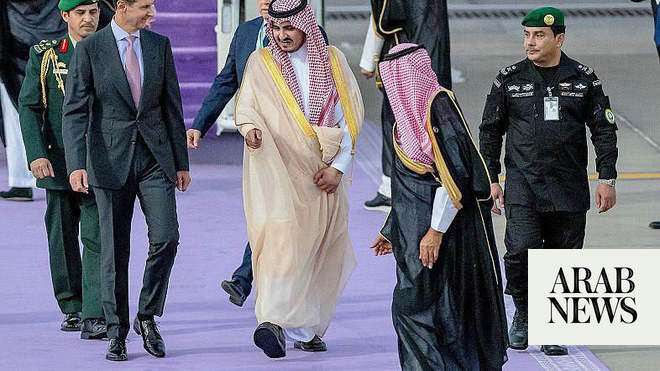
Some Arab countries are calling for the Syrian regime’s return to the Arab League, hoping this would bring about the beginning of a solution to the crisis in that country, which is fragmented and collapsed as a result of the prolonged war.
The bitter truth is that the Syrian civil war began when the regime still had full membership of the organization and the Arab League was subsequently unable to persuade Damascus to change its conduct. The Assad regime also did not allow any Arab representatives to help find a solution for Syria. It closed the door and rejected any Arab initiatives under the umbrella of the Arab League.
Moreover, the Assad regime moved toward a military escalation of internal crises, rather than dealing with them like countries that respect their own people do. Bashar Assad relied on Iran to solve the problem in a purely military manner and used his own intelligence services to fight the Syrian people, which led the country into a war in which all sides lost.
This indicates that the Syrian problem lies in the absolute intransigence of the regime and its refusal to cooperate with the Arab League and the international community in finding a political solution for Syria, which has fallen to its knees. Unless the regime changes the way it runs the country and deals with its critical situation, Syria will remain in a closed-loop crisis.
The UN and the Arab League have repeatedly asked the Syrians to respect UN Security Council Resolution 2254 in order to achieve a political solution. But the Assad regime has shown no willingness to recognize or implement the resolution, nor has it made any changes to address the crisis. So why should the Arab League take full responsibility for resolving this situation?
The regime chose to hand the country over to other states, including Iran, Turkiye and Russia. Therefore, the responsibility for the current situation rests with the regime and the countries that took over Syria militarily. The Iranian, Russian and Turkish armies control Syria’s future more than the regime itself, and certainly more than the Arab League.
The regime is to blame for Syria’s expulsion from the Arab League. Therefore, to regain its membership, the regime should change its policy toward Arab countries and its approach to the country’s problems.
The return of Syria to the Arab League should be based on any changes in the way the regime behaves in order to meet the group’s conditions. It should not be based on the league itself seeking to accept the Syrian government with all its flaws.
The Syrian regime has had several opportunities, the last of which was when some Arab countries normalized their relations with Damascus in the hope that Assad would respond positively to this gesture of goodwill. The regime did not respond to these positive steps and ignored the concerns of the Arab countries regarding Iran’s influence in the country.
Unless the regime changes the way it runs the country and deals with its critical situation, Syria will remain in a closed-loop crisis.
Ghassan Ibrahim
The regime should have reacted to the detente by taking immediate steps to reduce Iran’s role in Syria. Tehran’s presence poses a strategic threat to Syria itself and the neighboring Arab communities.
The Assad regime saw itself as victorious in the war against what it describes as “an international conspiracy against Syria” and expected Arab countries to accept deals without requiring any concessions.
If the regime had proceeded swiftly and removed the Iranian militias from Syria — most notably Hezbollah and the Revolutionary Guards — it would have been considered a step in the right direction. However, the regime did not see Iran as a threat to the region’s stability, but saw it as a friend, which soured relations with the Arab countries.
While last week’s Arab summit in Algeria was taking place, Assad’s contradictory position was best evidenced by the fact that he sent his foreign minister, Faisal Mekdad, to Tehran. Mekdad"s visit had a message for the summit: “We will meet our allies in Tehran while you meet at the Arab summit.”
Are there not sufficient indications that the Assad regime will not cooperate with Arab countries? The regime would also be a burden to the Arab League. If Assad returned to the League, he would be “Iran’s man” in an organization that consistently condemns Iranian interference.
It seems clear that there is nothing logical about bringing the Syrian regime back into the Arab League, as such a move would mainly represent the interests of Iran, not Syria or the other members of the organization.
Why would the Arab League restore Assad’s membership when Assad does not recognize the Syrian crisis as a problem that needs to be solved? The regime sees what is happening in Syria as a “conspiracy” against the so-called axis of resistance. Realistically, accepting the Assad regime back into the Arab League and turning a blind eye to the critical situation in Syria would be a threat to regional security.
The solution to the situation in Syria should begin with the implementation of the package of changes stipulated by UNSC Resolution 2254. This resolution was agreed upon and signed even by Russia, an ally of the Syrian regime, and included: Changes to the Syrian constitution to suit the new post-war phase; the introduction of presidential and parliamentary elections to ensure a smooth political transition; and the restructuring of Syrian state institutions to operate in the interests of Syria rather than Iran and its militias.
Any attempt to circumvent the resolution and return Assad to the Arab League without its implementation would purely mean putting a spoke in the wheel.
A refusal to accept the Syrian regime, as it stands, into the Arab League would not mean that the Arab states could not play an influential role in formulating, resolving and implementing a road map for Syria. This would require coordinated efforts at regional and international levels.
Arab League Secretary-General Ahmed Aboul Gheit last week called for an end to the crisis in Syria. At the 31st Arab League summit, he said in his speech that “the developments in Syria still require a pioneering Arab effort.” He added: “It is necessary to show flexibility from all parties so that the economic collapse and political blockage can be dispelled. Syria must engage in its natural Arab environment.”
It does not seem to me that this statement will change the reality of the Syrian crisis. The flexibility required must first start with the Syrian regime and then the Arab League. Arab states must, however, play a significant role in rescuing Syria from its plight and the evil influence of external players whose goals are limited to war and destruction.
The regime’s mentality today is no different from that of the war. Given that the Syrian regime has no will to reform, its return to the Arab League requires a regional and international balance to be considered. Why would the Arab League, which requires the consensus of all its members, welcome a regime that has not hesitated in trying to destabilize other Arab countries?
The Assad regime must understand that, due to its decisions to engage in drug production and trafficking and turn the country into a smuggling hub, Arab states will be reluctant to accept Syria’s return to the Arab establishment.
Without a political solution in Syria, the regime’s return to the league would mean a free bonus for Assad, which would be in no one’s interest and could jeopardize the region’s stability.
• Ghassan Ibrahim is a British-Syrian journalist and researcher on issues regarding the Middle East, most notably Syria, Iran and Turkiye. He can be reached at www.ghassanibrahim.com.












